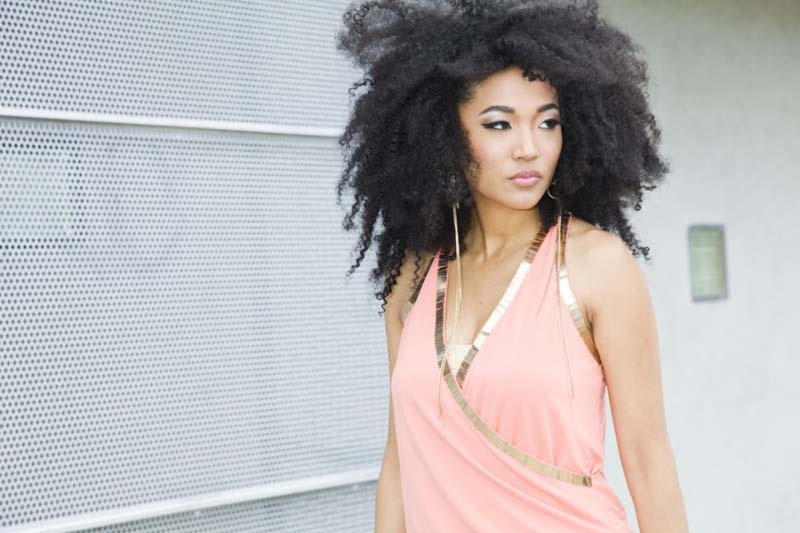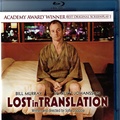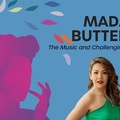I was lucky enough to see Judith Hill perform in Los Angeles during the 2010 convention of the Asian American Journalists Association, when she played a set for opening night. Hill had a unique story as a performer: the daughter of an African American father and Japanese mother who are both professional musicians, she earned a degree in music composition. She woodshedded in France in 2007. Hill’s professional breakthrough was supposed to be as Michael Jackson’s duet partner for the “This Is It” tour.
Yes, that’s the tour that never happened because of Jackson’s sudden death in June 2009.
Although she was unknown at the time, Hill caught the attention of the world when she sang the lead on “Heal the World” during Jackson’s televised memorial service. Her remarkable talent as a singer was also showcased in the October, 2009 release of the film This Is It documenting the rehearsals for the tour.
Then she went largely off the grid.
Except for small performances like the AAJA convention, songs she wrote and recorded for the 2012 Spike Lee film Red Hook Summer, and international tours for Avon and as a backup singer for Stevie Wonder (who says “no” to Stevie Wonder?), Hill kept out of the limelight despite an explosion of interest from the music industry. No matter how deserving, she didn’t want to use Jackson’s death as a stepping stone for her own career.
After waiting several years, she signed on as a contestant on “The Voice,” the NBC reality show that spotlights singers of all genres. Her powerful vocals carried her through most of the season, but viewers voted her off after the Top 8 episode, to the shock and disappointment of many viewers. I stopped watching the show after Hill’s elimination.
But being booted from the show hasn’t hurt her career—her abilities shined through the audience’s dense voting choices, and she’s been busy since leaving the series.
She’s one of the vocalists featured in a new documentary, 20 Feet from Stardom, about some of the unheralded legendary background singers of the rock-and-roll era, that’s garnered rave reviews. The film premiered in January, 2013 at the Sundance Film Festival.
She’s been working on her debut album as the front-and-center solo artist due later this year.
Hill is currently touring with Josh Groban, but she’s taking a break to play a solo show in Denver set for Tuesday, October 15, 2013 at the Soiled Dove Underground.
Hill responded by email to some questions I submitted about her music, her background, and balancing black and Japanese culture:
You’re one of the few “background” singers who’ve come front and center in the spotlight, including in the documentary 20 Feet from Stardom. Do you feel like a role model for background singers everywhere?
I have had the opportunity to sing with some of the greatest artists in this business. Being a background singer is the best schooling to becoming an artist because you get a front row seat to greatness, and you take so many amazing experiences with you everywhere you go. It’s a wonderful life, and I hope that my story is encouraging to aspiring background singers out there.
Although you’re known for soul and R&B music, you have a really varied background in all kinds of music including gospel and classical composition. You also speak Japanese; have you sung enka music? I describe the Japanese pop genre as “Japanese blues” in subject matter, if not musical style.
I really enjoy Enka music. I think that it is so rich and full of soul. Although I have never sung Enka personally, I am inspired by this amazing art form. I have always had a strong connection to traditional forms of music—it is the blueprint to modern styles. Going back to tradition is a great way to make your music much more powerful and dynamic.
How much Japanese culture did you grow up with from your mother? How has that affected your worldview, as well as your music?
Growing up, I was heavily influenced by my mother and the Japanese community in Los Angeles. We had many potlucks and gatherings that made up a big part of my home life. But, during my more recent years, I have visited Japan several times and connected with my family there. Musically, I’ve incorporated traditional Japanese flavors in my pop songs, or sometimes I will sing little phrases in Japanese.
Have you toured in Japan (and the rest of Asia)? What was the reception like?
I have toured Japan for various different reasons. Every year, I teach at the music schools in Sendai, Osaka, Nagoya, Fukuoka, and Tokyo. I also have done collaboration songs and performances with different J-pop artists. The reception there has been so warm and loving. Fans are so passionate and really show their appreciation.
Can you tell me a little about your debut album? Did you write all the songs? Certainly, with your already established career and industry visibility, no one can accuse you of being an overnight sensation.
I do write and co-write all my songs. I’m really excited about my debut album. It is a very soulful sound with a healthy blend of inspirational songs and fun/dance type of songs. I love to infuse different flavors of world music in these pop songs, because world music is a big part of me.
“The Voice” put such emphasis on your singing ability, and your years as a background singer did too. Do you consider yourself a vocalist or a broader musician? I guess a better way to phrase that is, do you worry about being pigeonholed as only a singer?
I’ve always considered myself a composer first, then a singer. Studying composition in college really did become my love and it equipped me to become a better singer and musician. I think that it is the driving force to my artistry. But, my experience as a singer dates back to my first song at four years old. I am very grateful for the early experience. But, even in my experience as a singer, I find that I think and make musical choices as a musician.
Do you enjoy songwriting? What’s your process for composing songs?
My process for writing songs varies. Often times I will come up with the melody first and build upon it. But, if I find a great lyric or title, that is the ticket. Riding my bike, walking around, or any form of being mobile really gets me going in the songwriting process.
What’s your all-time favorite song, of any genre?
“What A Wonderful World”, Louis Armstrong
How has your time on “The Voice” affected your career? Do people on the street now recognize you everywhere?
Many people do stop and recognize me on the street. It’s amazing how many people do watch that show. And a lot of great opportunities have come from that show… The Groban tour, William Morris, Sony deal, etc…
During your run in “The Voice,” were you chomping at the bit to launch your career as a singer-songwriter instead of someone covering others’ music?
I actually really enjoyed covering songs on that show. It was the best way for me to discover who I am as an artist. I discovered what cover songs worked best for my voice, and it helped me write the better melodies for my voice.
And I had to ask a Michael Jackson question, which I’m sure you’re tired of fielding: It seems like he came into your life like a comet and left in a blink… what have you taken away as an artist from your brief time working with him?
I learned that you must dream big and work your butt off to make it happen. Watching him create magic on stage really opened my eyes to the possibilities. I am forever grateful to him for being such an inspiration in my life.
How did it feel when you were voted off “The Voice?” My wife and I stopped watching the rest of the season, we were so pissed off.
At the moment, it was very uncomfortable and disappointing, but I didn’t have much time to grieve. I quickly became grateful for the experience because so much good came out of it.
* * * * *
Here are some videos of Hill:
“Heal the World” from the Michael Jackson Memorial Service >>
Michael Jackson and Judith Hill from This Is It >>
Trailer for 20 Feet from Stardom >>
*This article was originally published on Nikkei View on October 14, 2013.
© 2013 Gil Asakawa







